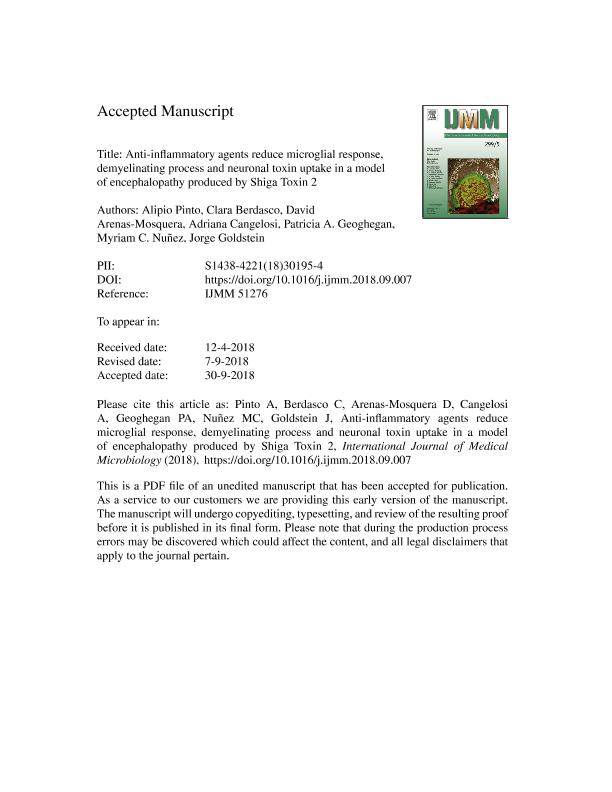Artículo
Anti-inflammatory agents reduce microglial response, demyelinating process and neuronal toxin uptake in a model of encephalopathy produced by Shiga Toxin 2
Vasconcelos Esteves Pinto, Alipio ; Berdasco, Clara Valentina
; Berdasco, Clara Valentina ; Arenas Mosquera, David
; Arenas Mosquera, David ; Cangelosi, Adriana; Geoghegan, Patricia A.; Nuñez, Myriam C.; Goldstein Raij, Jorge
; Cangelosi, Adriana; Geoghegan, Patricia A.; Nuñez, Myriam C.; Goldstein Raij, Jorge
 ; Berdasco, Clara Valentina
; Berdasco, Clara Valentina ; Arenas Mosquera, David
; Arenas Mosquera, David ; Cangelosi, Adriana; Geoghegan, Patricia A.; Nuñez, Myriam C.; Goldstein Raij, Jorge
; Cangelosi, Adriana; Geoghegan, Patricia A.; Nuñez, Myriam C.; Goldstein Raij, Jorge
Fecha de publicación:
12/2018
Editorial:
Elsevier Gmbh
Revista:
International Journal of Medical Microbiology (print)
ISSN:
1438-4221
Idioma:
Inglés
Tipo de recurso:
Artículo publicado
Clasificación temática:
Resumen
Infections by Enterohemorrhagic Escherichia coli may cause in addition to hemolytic uremic syndrome neurological disorders which may lead to fatal outcomes in patients. The brain striatum is usually affected during this outcome. The aim of this study was to determine in this area the role of the microglia in pro-inflammatory events that may occur during Shiga toxin 2 intoxication and consequently to this, whether oligodendrocytes were being affected. In the present paper we demonstrated that anti-inflammatory treatments reduced deleterious effects in brain striatal cells exposed to Shiga toxin 2 and LPS. While dexamethasone treatment decreased microglial activation and recovered myelin integrity in the mice striatum, etanercept treatment decreased neuronal uptake of Stx2 in rat striatal neurons, improving the affected area from toxin-derived injury. In conclusion, microglial activation is related to pro-inflammatory events that may deteriorate the brain function during intoxication with Stx2 and LPS. Consequently, the role of anti-inflammatory agents in the treatment of EHEC-derived encephalopathy should be studied in clinical trials.
Palabras clave:
DEXAMETHASONE
,
ENCEPHALOPATHY
,
ETANERCEPT
,
HUS
,
INFLAMMATION
,
NEUROPROTECTION
Archivos asociados
Licencia
Identificadores
Colecciones
Articulos(IFIBIO HOUSSAY)
Articulos de INSTITUTO DE FISIOLOGIA Y BIOFISICA BERNARDO HOUSSAY
Articulos de INSTITUTO DE FISIOLOGIA Y BIOFISICA BERNARDO HOUSSAY
Citación
Vasconcelos Esteves Pinto, Alipio; Berdasco, Clara Valentina; Arenas Mosquera, David; Cangelosi, Adriana; Geoghegan, Patricia A.; et al.; Anti-inflammatory agents reduce microglial response, demyelinating process and neuronal toxin uptake in a model of encephalopathy produced by Shiga Toxin 2; Elsevier Gmbh; International Journal of Medical Microbiology (print); 308; 8; 12-2018; 1036-1042
Compartir
Altmétricas



